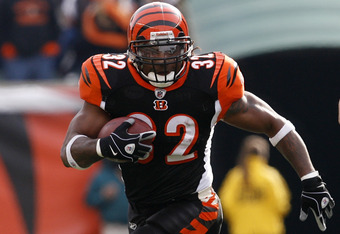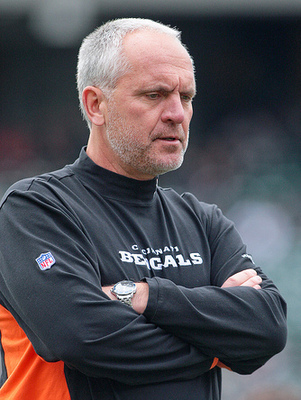
In mid-December the cracks began to show. A month later, the dam completely opened up and now the face-of-the-franchise is out of here.
Once Carson Palmer said in a press conference that he could see himself playing elsewhere in the future, it was clear that he had his eye on the door. I wrote at the time that this was a strategic move that both applied pressure on team ownership and also alerted other teams of his potential availability. Carson has been one the most guarded, company-line Bengal employees Mike Brown could ask for; he criticized only himself and always praised those around him. Yet, when asked if he could picture himself in another uniform, he let his guard down and spoke the truth. To me, that was the day he really asked for a trade. He knew what he was saying; it was a business decision.
And now this.
Had Chad Johnson said this, everyone would have waved him off as a human twitter feed who has produced more gossip than catches over the last few years. When Carson Palmer airs something so bold, however, it deserves to be taken very seriously.
Carson's people—whether that means agent, friends and family, or a split personality, I'm not totally sure—didn't claim that he would be receptive to a trade, or that he might hold out if one is isn't arranged, but rather that he will hang it up for good and roll around in the few millions he has stockpiled if the Bengals remain his only option of playing football. Palmer knows who he's up against—he' grown to learn a great deal about the villain who writes his checks. Simply expressing dissatisfaction to the public wouldn't get the old man's attention. So instead, he whipped out the big guns right away and announced that he would walk away from the game and leave behind the $50 million bucks he's been promised rather than play one more game wearing a striped helmet. In an era when star athletes refuse to play for more money, here is the opposite case. In this scenario, he can play as poorly as he wants and not only will the team not cut him, they will continue to fork over tens of millions of dollars each year, even if he's hurt. And he doesn't want to do it.
What a statement.
The fact he still wouldn't mind playing football for someone else is the real indicator of just how bad the organization is as a whole. Had he just decided he didn't love the sport that much or that his kids need him more than the game does, the motives would be open for interpretation, but it's strictly the Bengals that is the problem in his eyes and that should be an eye-opener for the few remaining doubters out there thinking that this team is still a legitimate and competitive enterprise.
Will Mike Brown accommodate Palmer and find him a new home? Of course not; he's under contract and that's that. Will Carson make good on his press-released threat and stay home with the twins if he's not dealt? I suppose he would, I don't really know Carson like that. Would everything be okay if he did comeback and be named the starter as if nothing really happened? Absolutely not.
The real question though, is what set him off to this extent? Chad and TO? Marvin? Brat? Cincinnati?
If I were to stab at a reason, I would say it's a combination of all of these things. The culture of losing and the complacency and lethargy to improve had to erode his soul overtime. Maybe he could feel himself shrugging off losses too easily, or perhaps each one collapsed in on him more and more until he reached his limit and said enough. Either way, hopeless losing with no change in sight likely frightened the man to his core and forced him to realize that he would rather spend his best remaining physical years on a more just cause. On people who care about winning. On something worth all the hard work he puts in.
The fact that Carson was so doggedly loyal over his professional career also magnified the meaning of his recent trade demand. He kept his chin up and took the media shots and the heat from fans without complaint or any visible effect at all. He was a PR rock, a dependably boring interview, and an emotional buffer between hot-shot receivers and hard-nosed coaches. It seems to me that once he found out the offense would be led by the same brain-trust for the foreseeable future, his shell cracked and what oozed out was determined insubordination hellbent on forcing a change. When all of his wishes were met with stubborn resistance, he probably grew angry and gave the go-ahead to go public with the spat.
Mike Brown had to give his response which sounded something like this: No. Each time Brown addresses the media, a Bengals fan losses a wing (and interest). With all the interminable dross of written material on all of this business, no one seems to blame Palmer, and everyone blames Brown. And why not? Now they have no quarterback, they have retained a coaching staff the city fervently dislikes, they're coming off the most disappointing season in franchise history, ticket prices will remain grotesquely high despite the near-certain attendance woes expected next season, there will be no additions to the scouting department or to general-management, ownership wants concessions from county taxpayers for a new scoreboard next season, and the stadium workers have taken to eject those fans expressing dissent while at the games.
Carson Palmer knows more than we do about the Bengals and even he, a level-headed family man who is scheduled to financially set up another four generations by staying with the team, is bailing on them. Why should we, the people who make up the city the Bengals dare represent, feel any differently? Blind loyalty to the hometown team? I'm proud of Carson for taking a stand. His actions have spoken to the world of how broken this football operation is and have turned up the pressure on Brown to act like a responsible sports owner.
The makings are in place for one of the worst relationships ever between owner and city in the history of professional sports. I expect mobilized acts of public protest demanding organizational changes made in regards to either the competitiveness of the product or the lowered cost to support the product or both. With such a high ranking figure-head broadcasting his dissent the way Palmer has done this week, an internal unraveling could be in the works where more and more personnel take a similar stance. When the field sergeant walks out, the rest of the troops take note. Maybe if everyone turns their back on this tyrant, he might get the point.
Mojokong—only his apprentice can slay the emperor. We will need Marvin to eventually turn as well to make the process complete.








